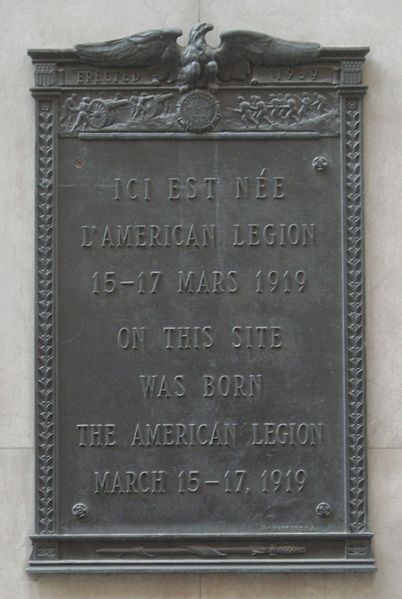
The Paris Caucus in March was by its nature limited to soldiers of the AEF who remained in Europe; a parallel organizational meeting for those who had returned to the American preparatory to a formal organizational convention was deemed necessary. This was a conclave dominated by the presence of Theodore Roosevelt, Jr., who called the convention to order amidst mass chanting akin to that of a Presidential nominating convention—"We Want Ted-dy! We Want Ted-dy!"
A minor crisis followed when Roosevelt twice declined nomination for permanent chairman of the session, to the consternation of many overwrought delegates, who sought to emphasize the symbolism of President Theodore Roosevelt's son maintaining the closest of connections with the organization.
The work of the St. Louis Caucus was largely shaped by the fundamental decisions made by the earlier Paris Caucus. Its agenda was in addition carefully prepared by a 49-member "Advance Committee", which included at least one delegate from each fledgling state organization and which drew up a draft program for the organization in advance of the convention's opening.
As time before the scheduled start of the convention was short, delegation to the assembly was highly irregular. On April 10, 1919, Temporary Secretary Eric Fisher Wood mailed a letter to the Governor of every state, informing them of the forthcoming gathering and making note of the non-partisan and patriotic nature of the League. Follow-up cables by Roosevelt and Wood encouraged the organization of state conventions to select delegates. This was, however, largely a failed formality, as states lacked sufficient time to organize themselves and properly elect delegates to St. Louis. In practice, the fledgling organization's provisional Executive Committee decided to allow each state delegation twice as many votes at that state had in the United States House of Representatives and left it to each to determine how those votes were apportioned.
Participants at the St. Louis Caucus were enthusiastic although the session was not a productive one. Fully two days were invested choosing ceremonial officers and selecting Minneapolis as the site for the organization's formal Founding Convention in the fall. Over 1100 participants competed to gain the floor to speechify, leading one historian to describe the scene as a "melee" in which "disorder reigned supreme." Consequently, passage of the program by the gathering was largely a pro forma exercise, rushed through during the session's last day, with the actual decision-making process involving such matters as the constitution and publications of the organization being done in committee at night.
The preamble of the constitution adopted in St. Louis became one of the seminal statements of the Legion's orientation and objectives:
For God and Country we associate ourselves together for the following purposes:
To uphold and defend the Constitution of the United States of America; to maintain law and order; to foster and perpetuate a 100 Percent Americanism; to preserve the memories and incidents of our association in the Great War; to inculcate a sense of individual obligation to the community, state, and nation; to combat the autocracy of both the classes and the masses; to make right the master of might; to promote peace and good will on earth; to safeguard and transmit to prosperity the principles of justice, freedom, and democracy; to consecrate and sanctify our comradeship by devotion to mutual helpfulness.
The St. Louis Caucus spent much of its time discussing resolutions: whether a stand should be taken on the League of Nations, Prohibition, or the implementation of universal military service, whether posts composed of Negro soldiers should be established, and whether Secretary of War Newton D. Baker should be impeached for his apparent leniency towards conscientious objectors in the months after the war.
A particularly hard line was taken towards the American radical movement, with one resolution passed on the final day calling on Congress to "pass a bill or immediately deporting every one of those Bolsheviks or Industrial Workers of the World." Minneapolis, Minnesota was chosen for the site of the founding convention of the organization in November over the more centrally-located Chicago after much acrimonious debate about the perceived political transgressions of the Chicago city administration.
